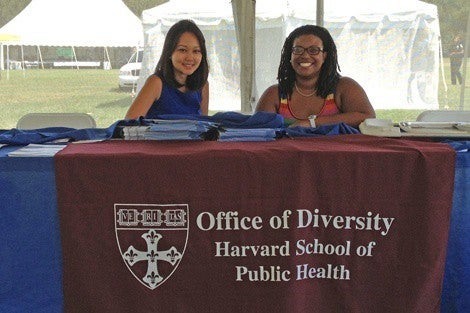October 9, 2013 — Racial disparities continue to exert a harmful influence on the health of non-whites in the United States, affecting such measures as obesity rates, infant mortality, and access to health care. Now, a new collaborative effort launched by Harvard School of Public Health (HSPH), the Centers for Disease Control and Prevention (CDC), Martin Luther King, Jr. Center for Nonviolent Social Change, the Satcher Health Leadership Institute at Morehouse School of Medicine, and Brown University, is aiming to mobilize the next generation of leaders to take on health inequalities as a matter of social justice.
The Social Equity Leadership Mobilization Alliance (SELMA) has two components aimed at graduate students in public health, policy, and medicine: an annual leadership summit and a summer fellowship program. Students must be nominated by their schools to participate in the intensive two-day summit, which takes place in Atlanta at the CDC and The King Center. The event brings students up to speed on the latest research on health disparities and engages students in problem-solving to identify strategies for addressing them. The first summit took place this past spring. HSPH students Zinzi Bailey, SD ’14, Cyndie Hatcher, MPH ’13, Pamela Hung MS2 ’14, and Uchenna Okoye, MPH ’13, attended.
The program’s second phase will include a highly competitive fellowship program. Fellows will spend a summer working in groups in communities around the country developing action plans to address specific inequalities identified by the CDC as “Winnable Battles,” such as teen pregnancy, and tobacco use and exposure to secondhand smoke.
For Dale Trevino, director of the Office of Diversity and Inclusion at HSPH, launching the SELMA program during the year marking the 50th anniversary of Martin Luther King, Jr.’s March on Washington and “I Have a Dream” speech is particularly significant. “We have been working closely with the Reverend Bernice King, who is MLK’s daughter and the director of The King Center. She talks about her father saying that improving access to health and healthy lifestyles was going to be his next big push. He felt back then that health was an unresolved civil rights issue.”
HSPH’s Office of Diversity and Inclusion hosted a table at the March’s anniversary observance in Washington, D.C., in August. Bailey and Tam Duong, SM ’14, who are both studying social and behavioral sciences, provided information to passersby on the Affordable Care Act and healthy lifestyles.
“It was really rejuvenating for me to be there,” said Duong. “Studying theories and epidemiology can feel so far from what’s happening on the ground and in communities. I’m clearer about my role in working to end health disparities and my role in continuing the movement. To see thousands of people come together and march for very similar reasons was very powerful. I brought that feeling home with me and will remember it in the future.”
Photo: Dale Trevino
Learn more
Progress, but challenges in reducing racial disparities (HSPH News)
